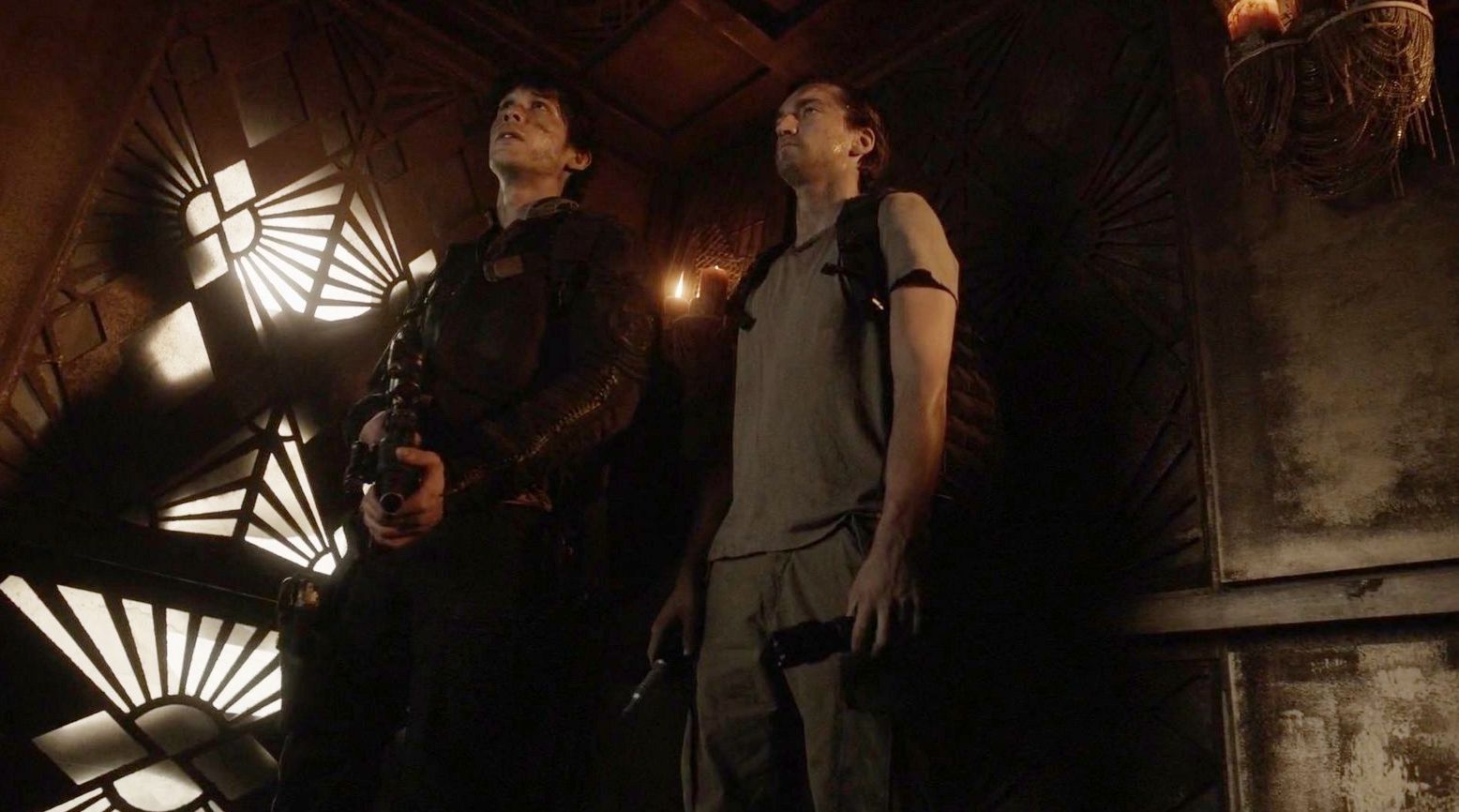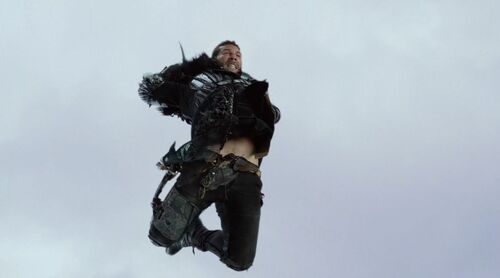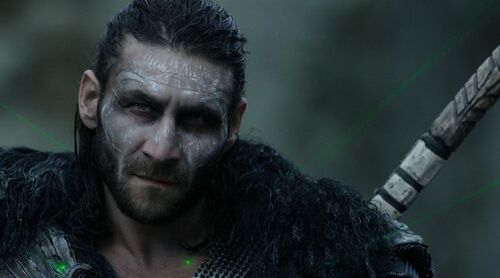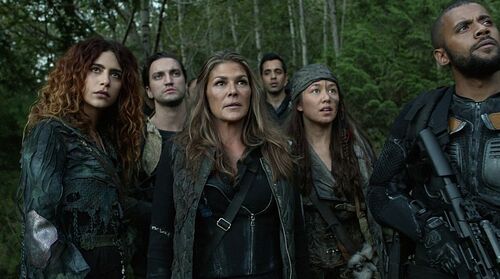
The 100 S3E15: "Perverse Instantiation Pt. 1" Review
 Perverse Instantiation Part One integrates the themes of the season into an action-packed episode that unites our favorites in a desperate plan.
Perverse Instantiation Part One integrates the themes of the season into an action-packed episode that unites our favorites in a desperate plan.
So, that was an amazingly crazy episode! Full of high-stakes action peppered with comedy (what?), torture (of course), and heartwarming moments turned into The Shining (sigh, Jasper).
Perverse Instantiation Pt. 1 was definitely one of the best episodes of the season. Before part two of the finale airs, I want to take some time to dig into both Clarke and Bellamy’s journeys this season. Bellamy’s arc has been mostly completed as of this episode, but Clarke has her final descent and return to complete, so it’s a good time for some context for both. Review at the end.
CLARKE'S JOURNEY FROM ISOLATION TO HOME
Clarke’s journey this season has been a hard one to watch for any fan of hers. By nature of who Clarke Griffin is her pain has been internalized, and for the better part of the season she tried to escape it. The season premiere finds her in the forest and living half-feral, naming herself “no one”. Once she’s caught by Roan (3.2) and taken to Lexa’s court, she turns (in a week) from feral-Clarke into ambassador-Clarke, residing in luxury in a tower. She tries to work “for her people” in a Council that distinctly does not want her people. Clarke chooses to return to Arkadia in the same episode Lexa dies (Thirteen, 3.7), but isn’t able to leave Polis until after the Conclave that establishes Ontari as (fake) Commander (Stealing Fire, 3.9). Titus gives her the mantle of Flame Keeper, one that she is still wearing. Clarke is trying on all of these personas to find one she can inhabit, because she doesn’t want to be herself.
The evolution of these identities can be seen through her hair and costume styling in particular. In the woods, Clarke has red hair and is covered in dirt. In the tower ceremony at Polis (3.3), she’s wearing an ornate braid crown, Grounder-style makeup, and formal gown. Clarke’s remaining time in Polis is spent with styled hair and more ornate Grounder clothes. By the time she leaves in Stealing Fire (3.9), she’s wearing an armor coat, corset, and boots while her formal hair style relaxes into its natural state.
Even once she does return to her friends and begins to face herself and the damage her absence has done (Nevermore 3.11), she still escapes the people around her in two ways: one, by clinging to her mission (which, fair, it’s both world-saving necessity and a coping mechanism) and two, by still running away (ready to die in Demons, walking away from conflict in this episode). Only in Nevermore and Demons were we able to see the facade crack. In Nevermore, ALIE!Raven provokes Clarke into rage-screaming by bringing up Finn, Lexa, and Jake’s deaths. Later, as Bellamy bandages her hand, Clarke brokenly confesses: “She got to me.” In Demons, Clarke blames herself for letting Emerson live, and as mentioned above, is ready to sacrifice herself for them without even considering other options. Those vulnerabilities are covered over (though not resolved) after defeating Emerson, as can be seen by her renewed mission focus in Join or Die and Red Sky at Morning.
This episode, in particular, was a favorite of mine for Clarke. We got to see Clarke finally breaking—under the worst kind of torture, yes, but that has to say something about the mission-focus of Clarke—and realizing, yet again the personal cost to her of saving the world (again) (this reminds me of Buffy: She saved the world. A lot.*).
Watching Clarke go through this isolation and rocky reintegration has been a point of contention among fans: is she saying sorry to much? Is her desperation making her a villain? All of these are worthy questions—just last week I talked about how her deciding to take away Luna’s consent in taking the Flame was making the same choice as Jaha, the villain—but Clarke has never been perfect, which is what makes her so compelling.
What is true about Clarke is that she loves people, and loves her people, and will do anything for them—withstanding torture and her mother being hanged so she might have a chance to save them all. In that, Clarke does what only two other characters are shown doing this season (Monty and Luna), and that is sacrificing loved ones for the greater good. That quality does not always make her likable or relatable—but it makes her Clarke. She’ll make that choice time and time again and has to be able to accept that as a part of who she is.
Clarke’s arc this season is one of descent and return, of isolation to integration. It’s a journey and then—hopefully—a homecoming, though I don’t feel like the homecoming (both to herself and to her people) will be completed until season four. What happens in the next episode—her going into the City of Light—will metaphorically complete this arc and release her to finally choose for herself who she will become.
BELLAMY'S ATONEMENT ARC
Bellamy following Pike in a preemptive attack against a Grounder Army, as well as championing Pike to become Chancellor, are two of the most controversial aspects of season three. Execution issues aside (I’ll address that in my season three review), it happened, and it’s something that the show has been dealing with all season in regards to Bellamy. So, now that the finale is next week, let’s look at his arc in the broader context.
Season three of The 100 is strongly thematic, but if I was to pick one overarching theme it would be unity/togetherness. In episodes 3.1 and 3.2 it looks, superficially, like our heroes are “together”. The Adventure Squad goes out mapping in the Rover, Kane and Indra are BFFs, Lincoln is counseling Abby on how to use Mount Weather. There is a “Commander’s Truce” floating around.
But things aren’t as they appear. The genocide of Mount Weather (2.16) left a power vacuum while also substantially weakening Lexa’s position as Commander. There is a bounty out on Wanheda, which the Ice Nation Queen, Nia, is intending to exploit to launch a coup—and more telling, the Council agrees with her and almost unanimously (save for Clarke) gives a vote of no-confidence against Lexa. The politics that make for this tenuous “togetherness” are rapidly crumbling, just out of eyesight of Arkadia
Bellamy, too, isn’t really “unified” or “together” with the group, as much as it’s presented in 3.1. In Wanheda Pt. 1. Bellamy looks in control and ascending through the Marcus Kane School of Responsibility and Leadership but is actually dangerously close to falling apart. Wanheda Pt. 2 demonstrates this explicitly as he desperately tries, and fails, to rescue Clarke from Roan. When his second rescue attempt of Clarke (3.3) ends in disaster and with his girlfriend, Gina, killed in the Mount Weather bombing, the wheels are completely off.
After that, Bellamy chooses Pike. His support is crucial in Pike becoming Chancellor. He retaliates against the Grounder army sent to protect Arkadia from the Ice Nation. What was internally repressed (but still destructive to himself) becomes externalized with disastrous consequences. He fractures, and so does Arkadia.
While the execution of Bellamy’s descent was rushed (fridging Gina and little in-season context), his atonement arc has been well done. I’ve touched on it before in the Join or Die review, but since 3.15 worked to complete that arc it’s useful to take a broader look at how it happened, especially because parts of it are subtle.
First, in Hakeldama (3.5) he experienced his own anger with the original catalyst: Clarke. Clarke left and placed an enormous emotional burden on him. The confrontation between Bellamy and Clarke is pure resentment and anger on his side and stunned realization on hers. Bellamy’s ‘together’ at Mount Weather was to help Clarke bear a crushing emotional toll, one he thought they would work through together. But then she left, and though their fight touches on the leadership burden, it’s really about vulnerability and abandonment. It’s a brutal scene, and if you want to understand both Bellamy and Clarke’s arcs before the finale, bears rewatching.
After Clarke escapes Arkadia, Bellamy’s actions become more entrenched but his mindset starts to shift. However, the actions are what counts, and the ramifications are disastrous: not only is Monroe killed while “clearing” a village, but then Sinclair, Kane, and Lincoln are sentenced to death for treason. By Terms and Conditions (3.8) he reverses his stance on Pike, but it’s too little too late. In Stealing Fire (3.9), he tries to help, but the rebellion doesn’t trust him, and Lincoln is executed.
What The 100 does in the episode 8/9 arc is deny Bellamy the self-sacrificial gesture that most stories would go for, and ask something harder of him. Saving Lincoln would have made Bellamy feel better, but possibly would have alleviated his guilt without asking him to change his worldview.
Bellamy’s secondary season arc begins in Fallen (3.10) with Octavia beating him for his indirect part of (and her perception of his culpability in) Lincoln’s execution.* I do think that was in character for Octavia to lash out like that, as well as for Bellamy to do anything he could to make her feel better. He was also punishing himself, through her, and that’s messed up as well.
The execution of the Blake dynamic this season—from Bellamy supporting Octavia in leaving (3.3) to his acceptance of a radical anti-Grounder stance extending to his sister’s decisions—was incredibly fast, which makes it hard to know what The 100 intended for their relationship. My interpretation is that, like every other core relationship this season, the show intentionally broke it so it could hopefully be remade anew. For all that the Blake siblings are a beloved duo, their dynamic is one of fierce love rooted in an extremely dysfunctional childhood. Octavia beating Bellamy is the lowest point of both of their part one arcs, and it also signals the dissolution of their old way of relating to each other. Like every other significant pairing (Bellamy and Clarke, Clarke and Abby, Abby and Kane, Monty and Jasper, etc.), the Blakes are going to have to build a new relationship that can handle the trauma they’ve been through.
After that scene, Bellamy begins to make reparations. He turns Pike in to the Grounders. In Nevermore (3.11) he is faced with his demons and with Niylah’s cold truth that he is no better and no different than anyone else who acts out of anger and fear. In Demons, (3.12) Bellamy is reintegrated with his best friend, Clarke and brings Lincoln's body to Octavia for a proper Grounder burial. In Join or Die (3.13) he chooses to forgive Clarke and let his anger towards her go. All of those actions are powerful character work, but then The 100 goes a step further by demonstrating that there is a different way of life in Red Sky at Morning (3.14). Seeing that and hearing Luna speak of having a choice to perpetuate violence or not solidifies and actualizes Bellamy’s direction in Perverse Instantiation Pt. 1. First, he says no to Clarke’s desperate plan to scour Grounder villages for a nightblood. Then, he leads the tactical side of the mission in using non-lethal force against the ALIE-zombies. Only when truly pressed—when it was either ALIE-zombie or Murphy—does he kill the person, and even then, his hand shakes.
In an interesting dialogue twist, Murphy is the one who signals that Bellamy has changed. In Fallen, Kane asks Bellamy to examine whether he turned in Pike for his sister or “because it was the right thing to do.” After Bellamy says they can’t leave but instead need to rescue Clarke, Murphy says, “You know, after this doing the right thing can kiss my ass.” The camera focuses on Bellamy for a beat as he considers that—yeah, he’s doing the right thing.
That is change. That is real, true character work.
Does it look like atonement and redemptive arcs we’re used to? No. It does not. It’s one step at a time. There’s no huge sacrificial gesture (yet—I wouldn’t put it past him). Instead, The 100 offers us a roadmap of what it would be like to reintegrate people into our society who have done terrible things, people who want to change because they realize they were wrong. In short, the character of Bellamy Blake offers hope that people can change, and hopefully in season four, that extends through his relationships and the society they choose to build.
REVIEW
Perverse Instantiation Pt. 1 is a fierce opening gambit for the season three finale. My main critique is that Jasper taking the chip was not platformed well enough, though I want to see the finale before I make a complete determination on how his storyline pans out. Devon Bostick’s performance this episode, however, added a chilling subtext to the action in Polis, especially as he began reciting the list of the Delinquent dead to underscore the maybe-futility of trying to live on the ground.
By reuniting most of the characters either geographically or by mission, The 100 finally gets to mine dynamics we haven’t seen all season. All of that chemistry, and all of that history, elevated the already fantastic performances to new levels. It’s hard to pick a favorite moment, but the Roan/Clarke/Bellamy opening scene was perfectly timed physical comedy (“you have a real gratitude problem, you know that?”), and Murphy reuniting with the Delinquents to save the day was incredibly satisfying.
The technical aspects were, once again, exceptional. Jason Rothenberg, DO WHATEVER IT TAKES to keep your crew. The stunts, cinematography, editing, sound, and score have been a treat all season and enriched the storytelling in new and exciting ways.
Episode MVP belongs to Eliza Taylor, hands down. Taylor manages the intricacies of playing Clarke this season beautifully, and brings it all to a satisfying breaking point in this episode. Watching Clarke evolve from a complete loss of identity (3.1-3.3) to forced stoicism (3.3-3.4) to heartbreak (3.5-3.9) and now to saving the world (again) has been a remarkable journey. That the audience sticks with Clarke throughout it all is due to the vulnerability and determination Eliza brings to Clarke. To see her complete this journey in the next episode—which I hope means choosing to be Clarke Griffin in all of her wonderful complexity—is incredibly exciting.
*Shout out to @megsaysthings for the definitive Buffy/Clarke coverage this week. Also to @skikru for being the best beta reader ever.
**I want to make it clear I’m not condoning Octavia by saying that I think what she did is in character. I’ll be covering more about the Blake sibling dynamic, and in particular this scene, in my season three review. There are several different ways to look at it, as well as the continued effect it will have on the perception of Octavia.


